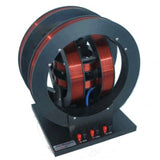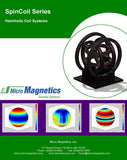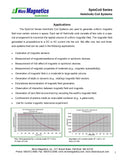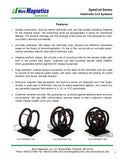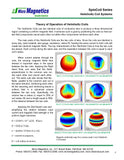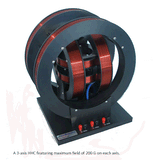The SpinCoil-XYZ-200 is a set of Helmholtz coils that can generate three-axis magnetic field up to 200 Gauss on each axis.
The SpinCoil series of Helmholtz coils are used to generate uniform magnetic field over a certain volume in space. Each set of Helmholtz coils consists of two coils in a special arrangement to maximize the spatial volume of uniform magnetic field. The magnetic field generated is propositional to a DC or AC current into the coil. A field-current calibration data for each set is provided.
Specifications:
Coil inner diameter: 11.25" (X), 7.5" (Y), 4" (Z)
Maximum continuous field: 200 G (X), 200 G (Y), 200 G (Z)
Weight: 90 lbs
Features:
- Quality construction: The SpinCoil Series Helmholtz coils use high quality insulating materials for the physical frame. The conducting wires are encapsulated in epoxy for mechanical stability. The physical package and the windings of the wires are manufactured for maximum field uniformity and stability.
- Accurate calibration: We design the Helmholtz coils' physical and electrical parameters based on the theory of electromagnetism. In addition, we provide an accurate experimental calibration data for each set of Helmholtz coil. Calibration accuracy is 0.4%.
- Adaptive platform design: The baseplate of the Helmholtz coils have a set of mounting holes for the installation of sample holder platform in the uniform field region. Customers can either make their own platform or order a sample holder platform.
- Easy operation: Colored banana connectors on the base of the Helmholtz coils are used to connect to external power supply, which each color indicating the polarity of current direction, and field direction.
- Multi-axis magnetic field generation: The SpinCoil series are designed such that single, double, or triple sets of Helmholtz coils can be easily assembled together. As a result, customers can generate magnetic field vectors in X, XY, or XYZ coordinates.
- Customer centered services: We guarantee our products against defective parts and poor workmanship.
Applications:
The SpinCoil can be used in a wide range of applications:
- Calibration of magnetic sensors
- Measurement of magnetoresistance of magnetic or spintronic devices
- Measurement of Hall effect of magnetic or spintronic devices
- Measurement of magnetic properties of materials, for example, magnetic susceptibility
- Generation of magnetic field in a moderate to large spatial volume
- Generation of static or dynamic, for example, rotating magnetic field vectors
- Educational demonstration of magnetic field generation
- Observation of interaction between magnetic field and magnets
- Generation of zero field environment by cancelling the earth's magnetic field
- Confinement of plasma inside an evacuated container, for example, a glass bulb
- Application in nuclear magnetic resonance experiment
Theory of operation of Helmholtz coils:
The Helmholtz Coils use two identical coils of conductive wire to produce a three dimensional region containing a uniform magnetic field. It achieves such a goal by positioning the coils so that certain field components cancel each other out while other components reinforce each other.
The main parts of the Helmholtz Coils are the two coils of wire. Since the coils are identical in every way, (wire material, wire gauge, resistance, radius R), feeding the same current to both coils will create two identical magnetic fields. The key characteristic of the Helmholtz Coils is how the two coils are placed. Each coil lies along the same axis, and the separation between the coils is equal to each coil’s radius.
When current passes through the coils, the ensuing magnetic fields then interact in important ways in the space between the two coils. Applying the Right Hand Rule, one sees that the fields perpendicular to the common axis run into each other and cancel each other out. The same rule also shows that the fields parallel to the common axis run in the same direction, reinforcing each other. All the canceling and reinforcing leaves a uniform field in a cylindrical volume between the two coils. Specifically, the volume has a radius (r) equal to 25% of coil radius (R) and a length equal to 50% of the distance between the two coils.
Applying the Biot-Savart Law and simplifying the relation between input current and magnetic field strength in the uniform region becomes:
B = (0.8991×10-6 nI)/R, where
B = field in Tesla
n = number of turns in a coil
I = current in amperes
R = coil radius in meters







